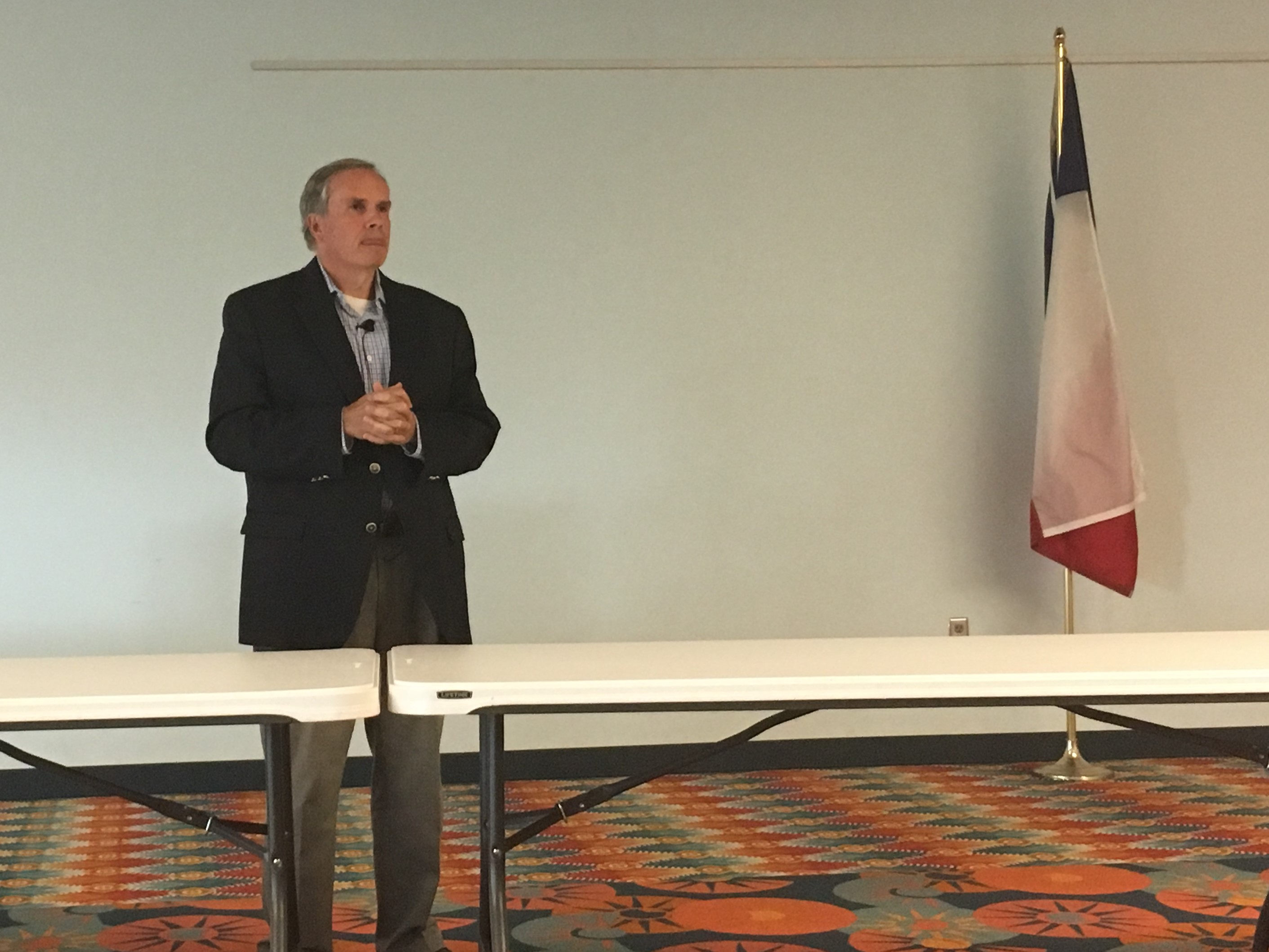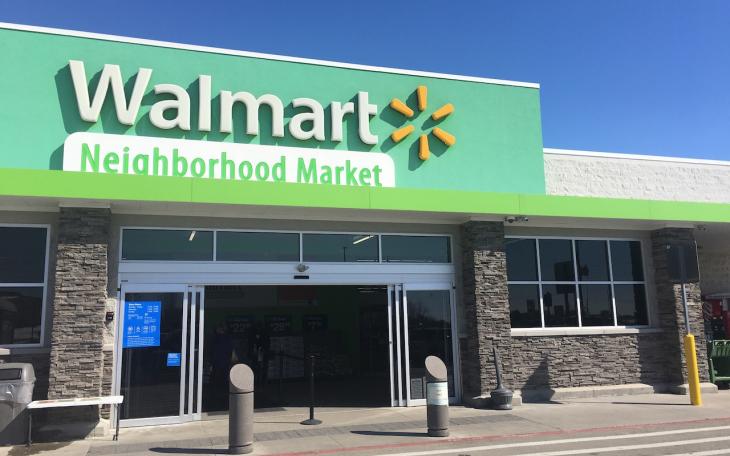Thursday evening at 7:00 p.m., in the Stephens Central Library, The Tom Green Democratic Party hosted a presentation to clarify aspects of the Affordable Care Act, or Obamacare.
This is the third meeting in the series for “Truth About,” and the meeting was titled “The Truth About Obamacare.”
A local citizen, Suzanne Daniel, attended the meeting because she has a “hatch to grind with the healthcare system.” She believes the hospital system here in San Angelo needs to be reformed. Daniel attended the meeting Thursday to show her concern as well as voice her opinion.
The Tom Green County Democratic Club stated the meetings are “a series of informational and non-partisan discussion focusing on topics of interest to voters, and sponsored by the Tom Green County Democratic Party.”
The meeting began by David Currie, chairmen of the Tom Green County Democratic Party, introducing the speaker, John Hawkins, president of government relations for the Texas Hospital Association (THA). Hawkins spent 25 minutes giving a speech to help address fact from fiction with Obamacare. Hawkins is responsible for managing all aspects of THA’s state and federal advocacy efforts between Texas hospitals and government agencies at all levels.

Currie began the meeting by pointing out that, “There has been nothing more controversial, probably, than the Affordable Care Act and Obamacare.”
Hawkins was brought to San Angelo to talk about how to fix Obamacare and make it better. Hawkins began his speech by explaining a little bit about THA.
“We are the statewide trade association; we are located in Austin," he explained. "We have about 500 hospitals that are members. Those are urban and rural hospitals, West Texas, South Texas, and all over the state hospitals. There are public and not for profit hospitals, such as Shannon, and investor owned. My job is to keep all of these people on the same page.”
Hawkins said he sends unified messages to Legislature and Congress so they know what is important for hospitals.
In regards to Obamacare, Hawkins said, “This is too important of an issue for this country, for us not to get it right. What needs to happen is for Congress to come together on both sides of the isle and fix this thing.”
Hawkins believes that the premise of Obamacare is still solid, but it is the financials and the timing of the bill that causes a problem.
“The reality is [that] healthcare costs are unsustainable in this country. We spend about $8,500 annually per capita, compared to about $4,300 in other industrialized countries. That is about 18 percent of our gross domestic product that’s going to healthcare. In about 2020, it will be 20 percent,” Hawkins explained.
Hawkins recognized the money spent on healthcare is money that will not be spent on other programs such as education, roads and water.
Another issue introduced was the Federal Budget System situation. Hawkins said, “The reality is, if you’re not talking about Medicare, Medicaid and Social Security, you’re not talking about reducing the Federal Deficit, because those are two-thirds of the Federal Budget.”
Hawkins also briefly addressed social security because the line has remained fairly flat. Meaning that Social Security has not been influenced much. But Medicare and Medicaid on the other hand are another story.

“The Medicare and Medicaid line are what’s really killing us, because again, these healthcare costs keep going up for a variety of reasons,” Hawkins said. “So here’s what you got to do; you [have] to have insurance reform where insurance companies hand choose to only cover folks [who] are generally healthy. That’s the system we had before. You have to create a mandate or financial incentive for everyone to play.”
By this, Hawkins noted that everyone should be treated the same and have the same options. If people chose not to pay for insurance, but still go to a hospital to get care, they will not pay a premium because they know there is a safety net.
“You [have] to change the way that individuals consume healthcare, personal responsibility,” Hawkins said. “Part of Obamacare is to change the payment system where you create a shared savings model, where providers actually work together to reduce the cost of healthcare because they’re actually going to share in that savings. They’re going to share with the beneficiary [and] share amongst themselves.”
Hawkins then touched on the Emergency Medical Treatment Act and Labor Act (EMTALA).
“This is the law that says that any hospital has to stabilize and treat to some level anyone present in an emergency room, regardless of the ability to pay.” This is technically a form of universal healthcare.
In Texas, 25 percent of the population is uninsured. After stating this percentage, Hawkins asked this question, “Why is it important to deal with the uninsured?” He answered by saying, “Right now, in Texas, [Texas hospitals] are reporting at least $5.5 billion a year in uncompensated healthcare costs to the state. Those are costs that are reimbursed.”
In Texas, if someone lives in a county with a hospital district, the local tax payers are picking up some of the costs. If someone lives in an area without a hospital district, then the costs are being shifted to a private market.
Hawkins said, “So in Texas, it is estimated that $1,800 a year in a family premium is used to cover the cost of the uninsured. That’s a hidden tax basically. So the Affordable Care Act, again, sought to do insurance reform. Basically, not to allow insurance companies to have lifetime limits for existing conditions, hold them to medical loss ratios so they actually have to pay out the majority of the money in premiums and not to administrative cost.”
As Hawkins' speech came to a close, the audience asked questions.
Currie asked, “Has Obamacare saved healthcare money?”
Hawkins answered, “It absolutely has, but again, the problem is through the direct provider. What we need to continue to do is the payment reform, where providers actually work amongst themselves to lower the cost of care.”
Daniel asked, “Do you think we would have been better off having the single payer option plan, like Canada has?”
Hawkins responded, “It’s hard to get a single payer with the system that we have, because again, we haven’t made those reforms yet. When you try to cost that out, it’s a big number. It is definitely a budget buster. You have to have all of these other things to go with it. What I have seen in other countries is they guarantee some kind of safety net level care.”
Another question from the audience was, “What is the ‘safety net’ if a premium is no longer paid because I do not make enough money a year? All that the hospitals would do is stabilize me then send me home.”
Hawkins answered, “That is not ideal, but that is why we would build a system where [people] have some type of coverage. The safety net is EMPALA; it requires a hospital to stabilize you.”
Overall, the attendees at the event had many questions about Obamacare, but it's unclear whether they left confident about the answers considering this continues to be a confusing and hot topic of discussion.
Subscribe to the LIVE! Daily
Required






Post a comment to this article here: